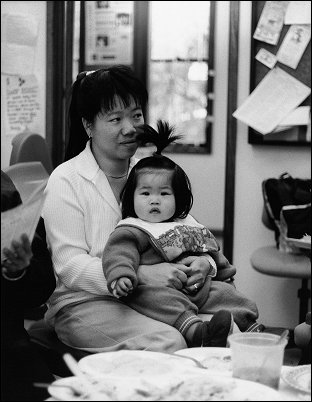Eng and Leng

Photograph, John Owens.
Eng: Both Leng and I were born in Cambodia but are mixed Chinese and Cambodian. We speak Cantonese and Teochiu at home and are teaching our daughter these languages. We don’t need to teach her English because she will learn it as she grows up. If we teach her English now she may forget her own languages. But we definitely don’t want to teach her to speak Khmer.
Things were very bad in Cambodia in the 1970s and a few of my aunties just disappeared. We heard no news from them and don’t know if Pol Pot killed them. In 1975, when I was a child, my family fled to Vietnam and lived in Saigon, where my parents owned a small fruit store. Ten years later we returned to Cambodia.
In 1994 Leng, who was living in Australia by then, visited his parents in Cambodia. His sister is a very good friend of mine and introduced us. After we married I came to Australia to join him.
I was both sad and happy when I arrived in Australia. As the plane flew into the airport, I saw many lights and it looked very beautiful. Soon after I arrived, my neighbour took me to the Cambodian temple where I studied English for a few months. The first time I tried to speak English I found it very difficult but I have learnt more now and I find it OK. My English classes at Clayton South are very good because each week I learn new words and the other students have young children for my daughter to play with.
Mostly I have learnt to speak English working in factories. I can now speak a little English and understand what people say. My first job in Australia was on an asparagus farm. I liked the work but it took a few weeks to get used to the movement of the production line. When the line was running fast I became very dizzy, got a headache and started vomiting. Later I got a job peeling onions. That was OK too but the onions made everybody cry.
In Cambodia the situation is still not very good and my parents are very happy that all their children live overseas. Although my parents still live in Cambodia, I have two brothers in Vietnam and a sister in Canada. When I was young I dreamt one day I would be able to travel overseas and now my dream has come true. I would like to go back to see my parents but not yet - one day.
Leng: My mother tongue is Teochiu but I also speak Cantonese and Mandarin and because I speak Chinese, Vietnamese is easy for me too. I only speak a little bit of Khmer and English. Years ago there were many Chinese people living in Phnom Penh. I just spoke Chinese and didn’t need to speak much Khmer. Then Pol Pot came in 1975 and many Chinese Cambodians fled to France and Hong Kong. Some went missing and some died. Too many died.
After Pol Pot arrived, I went to Vietnam with my family and lived in Saigon for five years before returning to Cambodia. When I returned the government started ordering people to go to the Thai-Cambodian border to cut trees. This was a very dangerous area with many mines and bombs exploding all the time. The government fed the people only rice. Any other food they had to find for themselves. The water was poisoned and many people got sick and died. The government told me that if I didn’t go and cut trees I would have to leave the country. I decided I would rather leave.
In 1985 I went to a refugee camp in Thailand. There were many people in the camp and it was hard to sleep. We had very little water and the United Nations gave us some food but not enough. I lived there for three years until my cousin sponsored me to come to Australia.
I felt very happy when I arrived in Australia because people here are free. They can talk about anything and the air is clean. My only problem was learning English, which I found very difficult. I only studied English for two or three weeks until I could find work. I now work in a factory building filing cabinets.
